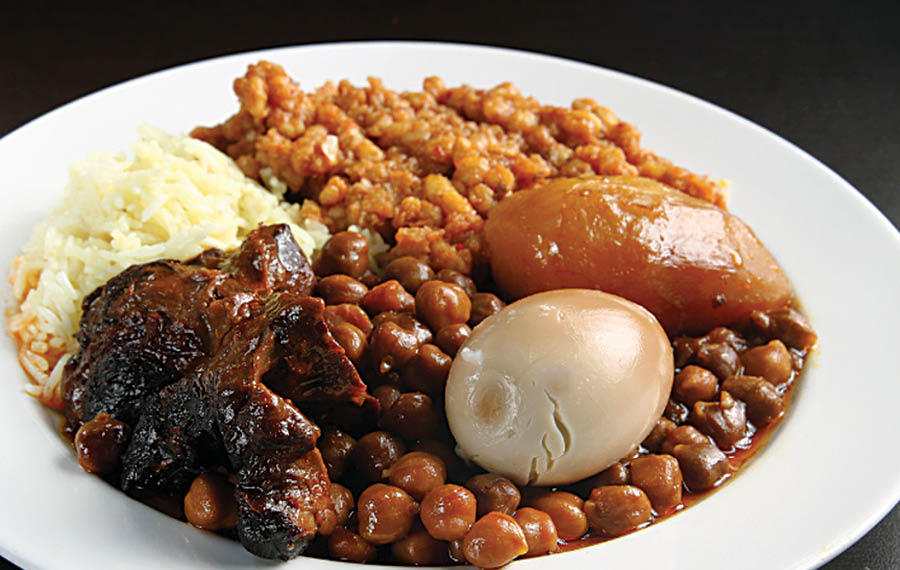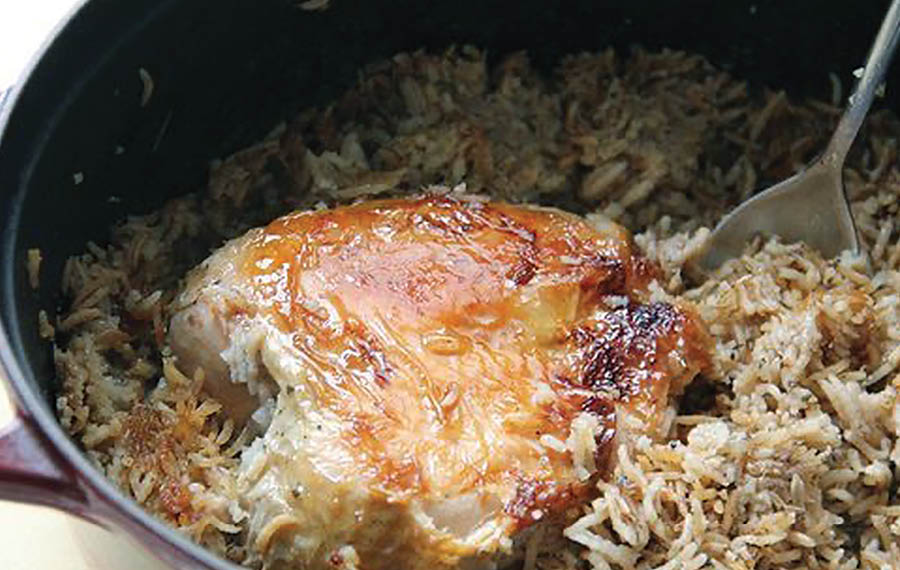 Rachel’s Dafina
Rachel’s Dafina In the five years that SEC FOOD (a project of the Sephardic Educational Center) has been featured on Facebook, our posts on Moroccan Dafina (meaning “covered”) and Iraqi T’bit (meaning “of the house”) have elicited the most likes, comments and shares. There’s something about the smell and taste of these Shabbat hamins that evoke love, memory and sentiment.
Sheff’s family left its Moroccan home more than 40 years ago, but whenever she replicates her mother’s Dafina recipe, her brothers, nieces, nephews and cousins come to her Shabbat table.
Gomperts’ family left Baghdad 70 years ago, but every Shabbat meal for her family is centered around a steaming platter of T’bit.
As a girl, Gomperts remembered threading the needle so her grandmother could sew together the chicken after she had deboned and stuffed it. She learned to make a much simpler version than her mother’s.
These overnight stews were an ingenious way to solve the challenge of serving hot, delicious food on Shabbat without breaking the prohibition against cooking on the Sabbath. Dafina is a scrumptious layering of red meat with wheat berries, garbanzos, white and sweet potatoes. It is sweetened with dates and seasoned with cumin and cinnamon. T’bit is chicken and rice seasoned with cardamom, cinnamon and turmeric. The long, slow cooking process results in a delightfully nuanced smoky caramelized flavor. Both dishes are cooked with whole eggs that become roasted, brown and delicious, and became known in Ladino communities as huevos haminados, roasted in the hamin.
In Morocco, Jewish families would send their pots of Dafina to the communal oven to bake overnight. Sometimes the wrong pot would be delivered on Shabbat morning, which could elicit either great joy or severe distress, depending on whom had prepared the Dafina.
There is a story that the smell of the T’bit was so alluring that Jordanian legionnaires would creep over the barbed wire border dividing Jerusalem in order to steal the pots of T’bit.
We instinctively awaken in the middle of the night to check the pot to make sure that nothing is burning.
In Israel, Dafina and T’bit have become the most popular take-out foods and have inspired restaurants solely devoted to these dishes. Don’t be intimidated by the many steps in these recipes; they are foolproof.
RACHEL’S DAFINA
also known as hamin, adafina, skhina or La Daf
1 bag garbanzo beans, soaked overnight
Small red potatoes and small sweet potatoes (1-2 small potatoes per person)
Meat (cheek meat or any fatty meat)
Marrow bones
1 large onion, cut in half
Pitted dates, for color
1 whole head of garlic, unpeeled, with top removed
12 eggs
Place beans, red potatoes, sweet potatoes, meat, bones, onion, dates, garlic in large pot. Season well with salt, pepper and a drizzle of olive oil.
Add water to cover halfway. Cook for 1-2 hours, depending on size of pot.
Meat loaf
1 pound ground beef
1 egg
Handful bread crumbs or potato starch
1/2 cup sliced almonds
1 teaspoon salt
1 teaspoon pepper
1/4 teaspoon mace
1/4 teaspoon nutmeg
1/2 teaspoon cinnamon
Handful fresh parsley, chopped
Mix all ingredients and form a log and place in cloth bag (cloth bags can be found at kosher markets). Set this aside.
(For vegetarian version, substitute 4 large, sliced caramelized onions for meat.)
Rice
1-2 cups white rice, rinsed
2 tablespoons oil
Salt to taste
Pepper to taste
1/4 teaspoon cinnamon
1/4 teaspoon turmeric
1/2 cup currants or raisins
Toss ingredients and place in a cloth bag.
After 1-2 hours of cooking stew, add cloth bags with rice and meatloaf to pot.
Boil 1 egg per person in shells for a few minutes until half hardboiled.
Add eggs to pot. Make sure there is enough water covering potatoes, and cook for 1-2 more hours.
Just before Shabbat, add more water if needed, bring to boil, then place in oven at 250 F or on low in crockpot or on a low heat placa.
Orisa
serve with Dafina
1/2 cup of olive oil
2 large onions, chopped
2 large sweet potatoes, cut in large pieces
1 large head garlic, whole and unpeeled
1 tablespoon paprika
1 teaspoon pepper
1 teaspoon cumin
2 chicken bouillon cubes (for vegetarian, use non-chicken bouillon)
Cayenne or harissa, to taste (optional)
4 cups of water
1 small bag soft wheat berries (about 2 cups) or regular wheat boiled until soft or soaked overnight
In a small crockpot or small pot, sauté onions in olive oil until golden.
Add other ingredients and mix well. Add cayenne or harissa, if using.
Add 4 cups of water and wheat berries, cover and cook for one hour
Place in crockpot on low all night, or place on placa or in low oven, next to your dafina.

SHARON’S T’BIT
Canola oil
2 onions, chopped
6 cloves garlic, minced
3 tomatoes, chopped
Crushed cardamom, to taste
Turmeric, to taste
Cinnamon, to taste
Ginger, to taste
Salt, pepper to taste
1 chicken
4 cups water
2-3 cups rice (Jasmine, long grain, brown rice or combination)
2 tablespoons tomato paste (optional)
12 eggs (optional)
In large ovenproof pot, fry onions in generous amount of canola oil. Add garlic and chopped tomatoes.
Add crushed cardamom, turmeric, cinnamon, ginger, salt and pepper.
Wash chicken and pat dry. Add to pot and sauté until golden on the outside and liquid runs out.
Cover with 4 cups water and bring to a boil. Simmer for 15-20 minutes.
Add rice and, if using, tomato paste. Stir well.
Cover tightly and reduce heat and let simmer until “dry.”
Just before Shabbat, cover with parchment paper and put a dozen whole eggs on top to make “brown” eggs, if desired.
Heat oven to 350 degrees. Bake for 30 minutes, then lower to 225.
Cook overnight until lunchtime the next day.
Notes: Soak beans and wheat berries the night before or they’ll absorb all the water in the pot, guaranteeing a burned dish. Dafina traditionally is served in separate dishes: potatoes, meat, wheat, rice, peeled and sliced eggs.
More from Sheff and Gomperts can be found here.
Sharon Gomperts and Rachel Emquies Sheff, known as the Sephardic Spice Girls, have known each other since high school. Sheff’s family roots are Spanish Moroccan. Gomperts’ family hails from Baghdad and El Azair, Iraq. They collaborated on the SEC Food Group and community cooking classes. Visit them on Facebook at SEC FOOD.























 More news and opinions than at a Shabbat dinner, right in your inbox.
More news and opinions than at a Shabbat dinner, right in your inbox.